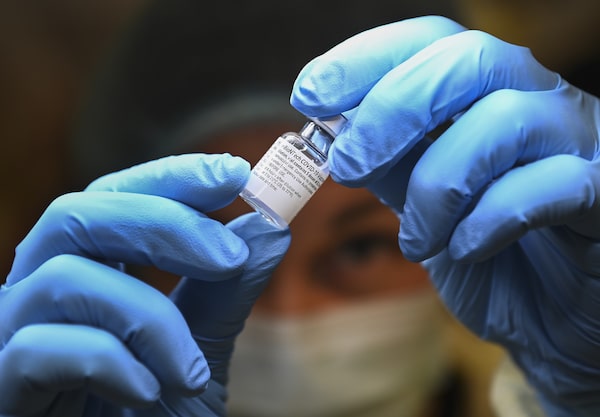
A health-care worker prepares a dose of the Pfizer-BioNTech COVID-19 vaccine at a UHN COVID-19 vaccine clinic, in Toronto, on Jan. 7, 2021.Nathan Denette/The Canadian Press
Canada is committed to helping poor countries obtain COVID-19 vaccines, Prime Minister Justin Trudeau said Friday as he rebutted criticism over Canada’s decision to draw from an international supply designed to help poor countries.
Oxfam Canada and the ONE Campaign say it is wrong for the federal government to agree to accept almost 1.9 million doses of vaccine from the COVAX Facility by the end of June.
But Mr. Trudeau said on Friday that Canada is one of the leading donors to COVAX, a new international partnership under the World Health Organization created last year to help deliver billions of expensive vaccine doses to poor countries that can’t afford them.
In return, donor countries are allowed to receive vaccines for their own use.
Canada is facing shortfalls in the delivery of vaccines for Canadians from two major international biotech firms, Pfizer-BioNTech and Moderna, which has the Trudeau Liberals under fire from their political opponents.
“When wealthier countries invest in COVAX, half of that funding is for doses at home, and the other half is to buy doses for low- and middle-income countries,” Mr. Trudeau said Friday.
“Our contribution was always intended to access vaccine doses for Canadians, as well as to support lower-income countries.”
Diana Sarosi, Oxfam Canada’s policy director, says it is wrong for Canada to accept COVAX vaccines because of domestic political pressure and says it will ultimately do harm in poorer countries.
“Canada should not be taking the COVAX vaccine from poor nations to alleviate political pressures at home. Receiving one or two million doses isn’t going to solve Canada’s vaccination challenges and it is going to cause harm elsewhere in the world for the poorest and most marginalized people,” Ms. Sarosi said in a statement.
“Purchasing more vaccines, when Canada has already purchased enough to vaccinate the entire population four times over, is not a viable solution.”
Mr. Trudeau said Canada remains committed to helping poor countries, through its commitment to COVAX and other international agreements.
Canada has pledged $220-million to COVAX and another $865-million to the ACT Accelerator, which tries to ensure low- and middle-income countries have equitable access to medical treatments during the pandemic.
“Canada is committed to making sure that the rest of the world doesn’t get left behind when it comes to vaccination. That’s why we are one of the world’s top donors to COVAX,” Mr. Trudeau said. “To beat this virus anywhere, we have to beat it everywhere.”
Ms. Sarosi and Stuart Hickox, the Canadian executive director of the ONE Campaign, called on Canada and other governments to force vaccine makers to give up their intellectual property rights so their vaccines can be more rapidly and affordably reproduced.
Mr. Hickox said Mr. Trudeau should join French President Emmanuel Macron and 100 other countries that are calling for a temporary waiver of intellectual property rights for COVID-19 vaccines at the World Trade Organization.
“There’s no doubt that this makes Canada look bad. What’s lost in this frenzy is the fact that COVAX is operating as it was designed, and that Canada is one of the biggest donors,” said Mr. Hickox.
“Once the domestic vaccine rollout stabilizes, Canada should announce a clear strategy of how Canada will share back the extra vaccines the government secured.”
Conservative Leader Erin O’Toole skirted a question on Thursday about whether he would reject the COVAX doses if he were prime minister.
Instead, Mr. O’Toole said he never would have let the current shortfalls happen if he were in charge 10 months ago. He said the fact that Canada was dipping into COVAX was a sign that the government had rolled out an inadequate plan to vaccinate Canadians.
“Canada should have made sure that we had a domestic supply that ensured we were vaccinated quickly so we could reopen the economy, get the economy moving together,” O’Toole said.
Only then, he said, should Canada play its role in helping the developed world.
“I would like to see the vaccines rolled out here as quickly as possible,” said Mr. O’Toole.
Green party Leader Annamie Paul said Friday that Canada is embarrassing itself on the world stage by taking doses from COVAX.
“There is a very big difference between having a right and doing what’s right,” said Ms. Paul. “This is not right.”
NDP Leader Jagmeet Singh said the COVAX issue highlights Canada’s inability to produce vaccines.
“This is all very troubling and just highlights how bad things are,” Mr. Singh told reporters Thursday.
The large number of COVID-19 infections in some places makes it more likely for new variants of the virus to emerge. Science Reporter Ivan Semeniuk explains how vaccines may not be as effective against these new strains, making it a race to control and track the spread of variants before they become a dangerous new outbreak.
The Globe and Mail
Sign up for the Coronavirus Update newsletter to read the day’s essential coronavirus news, features and explainers written by Globe reporters and editors.